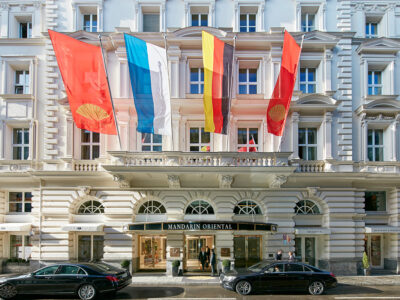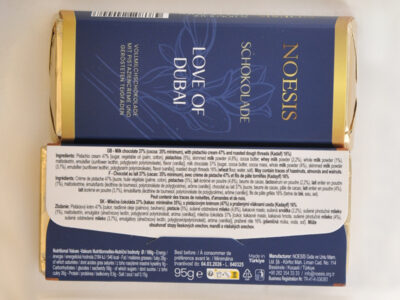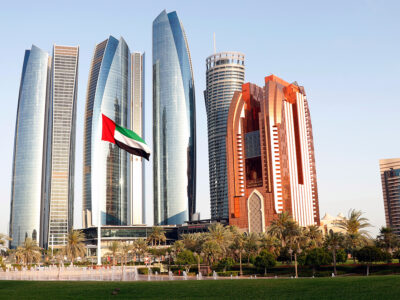Natural and organic products now represent a global market estimated at US $200 billion yet the Middle East appears to be behind when it comes to this growing trend.
While organic-friendly nations are busy installing vending machines in schools and offices that dispense fruit and veg, the Middle Eastern market appears to be slow on the environmental uptake.
Health advocate and Organic Foods and Café owner Nils El Accad first identified this trend about four years ago.
If you consider you can get cancer from the pesticides that are on some of those foods then health-wise it’s a better option. – Nils El Accad, Organic Foods and Café.
“I tried to go to supermarkets to get them to list organic food but they said they weren’t interested. They were literally laughing at me, so I finally decided that the only way I could really do this properly was to control the retail space, so I set up the Organic Foods and Café concept.
Since then there has been a steady increase in awareness in the market although due to the shrinking disposable income caused by rising prices in the region, coupled with a lack of organic understanding, there has been stagnation in certain categories of the market according to El Accad.
Natural confusion
A big problem in the market is the fact that people don’t understand what the term organic really means comments Accad.
“Most people don’t really have a clue so it’s difficult to educate consumers and break their habits because most people just go to the same supermarkets and buy the same products.”
In essence, ‘organic’ refers to products that are grown and processed without the use of pesticides, fungicides, herbicides, genetic engineering, artificial food colouring, preservatives, dyes, chemical coatings or irridation.
To be organic, the products have to be certified by a licensed third party independent certifier explains El Accad.
“The stuff on the shelves here is not certified; products may contain one organic ingredient but isn’t officially certified by international standards, which means anyone can call their products organic.”
“There were mushrooms a few years ago that were labeled organic in English and natural in Arabic, so I sent them to the lab to be tested and when we pushed them to it, they said they’re not organic. They didn’t even know what organic meant.”
Another element of El Accad’s produce is that it is bio-dynamic and contains the nutrients that are usually stripped from non-organic products.
“We also want the higher trace elements and higher nutrients and you only get that by growing traditionally, composting, not in a greenhouse.
“Some people don’t know what food is supposed to taste like. Kids don’t know what food is supposed to taste like – it’s sad.
Fresh challenge
Global food prices are on the rise with dairy products, grain prices and meat becoming marginally more expensive over the last two years according to leading industry professionals.
This, coupled with the dwindling dollar value and a further decrease in the average consumer’s disposable income, has led to a reduction in organic sales says El Accad.
“Food is expensive anyway and organic food has got more expensive on top of that, so right now we do feel that the growth is not where it should be,” he said.
One of the biggest challenges of getting good organic products to remote markets such as Dubai is importing in volumes explains El Accad.
“If you don’t import in large volumes then you don’t get the price right and, as the season for organic products is much shorter and in some cases sometimes a half or a third of the usual production, it makes consistency very hard to maintain.
El Accad attests the use of organic produce and says that the benefits are worth it.
Most people don’t have a clue what organic really means.
“If you consider that you can get cancer from the pesticides that are on some of those foods then health-wise it’s a better option. Also, if you calculate the nutrient value then organic food far outweighs conventional food,” he claims.
Green future
Organic exposure is on the rise in the region as people are starting to adopt world trends in healthier eating although this process takes time explains El Accad.
“There are a lot of developed economies that are catching up with the organic movement and that will filter through to the Middle East, but things like the disposable income crunch and escalating food costs really slow things down.
The organic cause got a further boost last year with the Ministry of Health officially endorsing the move towards healthier eating.
“We want to have more natural and organic products in our markets which are safer and healthier options and boost the opportunities and usage of these products on a larger scale and at more affordable prices for all people,” says Humeid Al Quttami, Minister of Health.
El Accad believes the way to achieve this would be to have more organic farms operating in the Middle East.
“The long term goal would be to have organic farms here and to have organic produce grown here in a more sustainable way,” he says.
“Nutrition is the most important thing for all of us, for our existence, to stay alive. I think people should put more effort into it. It’s just about getting people to be being proactive in the way they educate themselves on the issue of organic food.
“The concept for Shangri-La’s healthy lifestyle cuisine came into fruition in November 2007 and currently the healthy menus are being offered to the corporate meeting delegates,” comments Jean Michel Offe, group director of food and beverage for the Shangri-La hotel chain.
The healthy menu concept was established to offer alternative cuisines to guests, who find it difficult to eat healthily on a daily basis due to changes in schedules, sleep and work patterns and generally hectic lifestyles.
With this in mind, Shangri-La’s introduction of healthy menus aims to provide its guests with nutritionally-sound cuisine, which focuses on a balance of nutrition, while retaining food flavour and the cooking methodology of traditionally prepared dishes.
The menus are designed specifically to meet individual lifestyle and food preferences according to Offe and once a month, the F&B team meets with Wing to discuss the latest food trends, health concerns and special guests’ requirements.
Currently, Shangri-La has created Western and Chinese dishes in the healthy menus. The following are examples of some of the most popular dishes:
• Assorted mushroom salad with spinach
• Crab salad on buckwheat noodles
• Chicken breast roll with Enoki mushrooms, carrots and wild rice
• Salad of marinated charred squid
• Beancurd and wild mushroom broth
• Roasted chicken breast with asparagus and potato fondant
• Lemongrass-infused pana cotta with fresh tropical fruits








